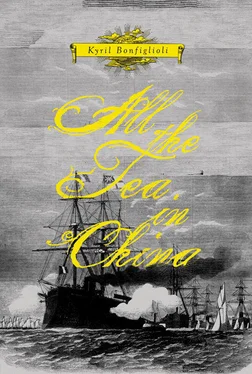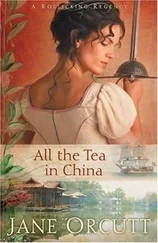Peter jingled the coins in his pocket and looked at me in a meaningful way. I understood in a moment and slipped a half-sovereign into the doctor’s hand. The hand closed upon it then opened again: the gold piece was gone! The next moment he retrieved just such a piece from my ear, with a merry chuckle. Clearly, the fellow was versed in the ancient African magic, although now I am inclined to believe that it was mere legerdemain. Be that as it may, I never laid out a piece of money so fruitfully: throughout the voyage that cook saw to it that my Dutch belly never wanted for plentiful and delicate fare. (Indeed, the whole ship’s company ate uncommonly well: the owners had the good sense — rare then and just as rare today — to know that an extra £100 laid out on galley-stuff over and above the usual rate of provisioning made for a sturdy and concentrated crew.)
From the galley we descended to the gun-deck, cable-tier and finally the hold, which was sparsely filled with cases and packages consigned to gentlemen in the East India Company’s service — much of it fowling-pieces, pistols and rifles — as well as boxes of bibles for colporteurs at the Cape and in India, crates of bottled India Pale Ale, fashionable mantle-makers’ rubbish for nabob’s ladies, china and silver-ware for their tables, hams, brandy, a few barrels of whisky (scarcely worth the carriage at 2/6d a gallon but there are Scotch officers who positively prefer it to brandy!), whalebone splints for the stay-makers, hats from Mr Lock, boots from Mr Lobb and umbrellas from Mr Briggs. My new friend explained that the vacant spaces in the hold would be filled at the Cape, for we were to take aboard a great deal of fiery African brandy, many cases of the delicious Constantia and Stellenbosch wines, bales of ostrich feathers which, although light, take up much space for they cannot be compressed, as much ivory as the owners’ agents would have been able to purchase and, with luck, some rhinoceros horns. The Chinese, he assured me with a solemn countenance, prize these last mightily: a cup made of such a horn will turn colour the moment poison is poured into it — no mandarin dares be without one — and the powder produced during the turning of the cup is worth its exact weight in gold because of its aphrodisiac properties. (I have seen rhinoceros horns as tall as a man.)
All the time Lord Peter was pouring facts and measurements into my ears; I coiled these away into my memory like a jolly jack-tar stowing an anchor-cable. At last he said that for the moment we were at the end of our task.
“Have you any questions?”
“Well, I should like to know why the ship is named the John Coram ? Who was he?”
“Sir,” piped up Orace from his respectful place at my heels, “Please Sir, I know!” We turned and stared at him; for my part I had forgotten that he was there.
“Well, boy?” said Peter, not unkindly.
“Sir, John Coram was a great merchant in the City of London and Great Coram Street where your friend Mr J. lives is named after him and amongst his other philanthropical works he founded the Foundling Hospital where I was fortunate enough to receive a good education and before that he was a master ship-builder in the American Colonies please Sir.”
The extent of the child’s knowledge was less amazing than the speed at which he rattled off his lore.
“Very well!” cried Peter, giving him a halfpenny.
“You are a good boy,” I said, patting him upon the head. He did not flinch, as he would have done a few weeks before.
“Now,” said Peter, fishing out a beautiful gold repeater from his fob, “it is my watch below and I fear I must take advantage of it, for I am standing watch and watch about and ready to swoon with fatigue.”
“Why is this?” I asked, puzzled.
“Oh, I came aboard drunk three nights ago and forgot to tip my hat to the quarter-deck. Re-living old times, d’you see; had forgotten I was no longer the owner’s son. It’s of no consequence. Now, you’d better make haste and report to the old — ah, to the Captain’s cabin; he sometimes becomes a touch querulous at about this time of day. I’ll see to it that your portion of my cabin is cleared for you by tomorrow noon: I’d count it a favour if you didn’t rouse me till then. Delighted to make your acquaintance. Sure we shall get on famously.”
With that he walked away, using a sort of wooden gait which betrayed the extreme fatigue which he had hitherto concealed. I looked at Orace.
“Poor gentleman,” he said, respectfully. I said nothing; Orace probably knew more about such states than I did in those days.
In the cabin, the Captain seemed quite a different man from the irate person he had seemed to be earlier, but I was not deceived.
“Well, Sir,” he said heavily, jovially, “what d’you think of my ship? Does she please you? Could you support the tedium of a profitable pleasure-cruise with us, d’you suppose?”
My mind started framing an English sentence which would tell him to go to the devil and perform curious acts with him, but at that very moment the inner door opened a crack and Mrs Knatchbull’s lovely face appeared, wearing an expression which delicately mingled humour, exasperation and a certain, well, a certain invitation. I was vexed to find myself answering the Captain in a civil — indeed an amiable — voice.
“I shall esteem it an honour to serve under you, Sir,” is what I heard myself saying.
“Good,” he said, “good.” He said it again once or twice, as though he approved of the word “good”. Then he pulled some papers toward him and from them rattled off at great speed some antique gibberish which I could not comprehend but which, I realised later, comprised the Ship’s Articles.
“You are, of course, a practising Christian,” he muttered, dipping a great pen into an inkpot and not meeting my eye, still less my nose. I opened my mouth. He peered up at me through the thickest of his eyebrows. The faintest rustle of silken petticoats filtered through the inner door.
“Aye aye, Sir!” I said staunchly.
“Sign here,” he said.

That last evening of my life ashore I spent in the street called Strand: curiously, this word means “shore” — was that not apt?
I ate a great quantity of turbot, some boiled mutton and a few nicely-dressed woodcocks, each set upon a toast which had been spread with the bird’s “trails”, peppered. “Trails” means guts. I also drank some wine.
Then I bade a prolonged and salty farewell to the tailor’s daughter whose name I forget and, as an especial treat, to her little sister also, for who knew when next I would find such charming and biddable girls? Then I drank some more wine, I believe. (I do not remember this wine but I recall a trifling sense of malaise the next day, which convinces me that I did drink a little something.)
That next day, malaise or no, I looked to all my small business affairs, made a bargain with my landlord about the lease, sent my stock-in-trade to Mr Jorrocks’ warehouse and my new sea-chest, replete with sensible clothes and improving books, to the John Coram at the Docks. Then I went to a shop in Jermyn Street where two genial partners called Mr Paxton and Mr Whitfield selected for me one black Bradenham ham, one pink York ditto, an incomparable Stilton cheese, three salted tongues, a monstrous Bologna sausage which they assured me would travel to the Indies and be none the worse for it after a year and a tinned box of delicate sea-bread called “Thin Captain’s Biscuits”. (They assured me that, but for a printer’s error, the name would have been “Captain’s Thin Biscuits”.) When I told them that I was a friend of John Jorrocks himself and that I would pay in coined gold, there and then, they cheerfully deducted seven and one half per centum from my score. Most of their business was with the nobility, you see.
Читать дальше













